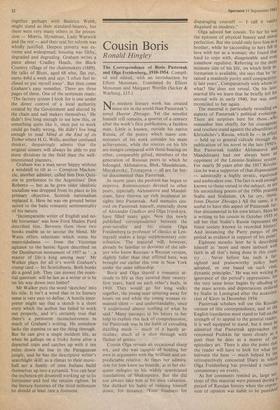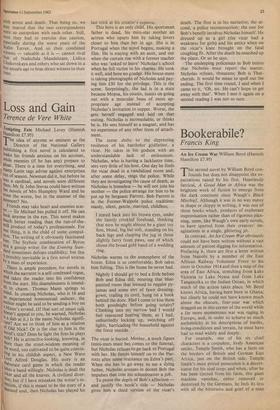Cousin Boris
Ronald Hingley
The Correspondence of Boris Pasternak and Olga Freidenberg, 1910-1954. Compil- ed and edited, with an introduction by Elliott Mossman. Translated by Elliott Mossman and Margaret Wettlin (Secker & Warburg, £15.) No modern literary work has created more stir in the world than Pasternak's novel Doctor Zhivago. Yet the novelist himself still remains, a quarter of a century after the work's first publication, a faceless man. Little is known, outside his native Russia, of the poetry which many con- noisseurs of his work consider his main achievement, while the sources on his life are meagre compared with those bearing on other, comparably gifted, members of the generation of Russian poets to which he belonged. Akhmatova, Blok, Mandelstam, Mayakovsky, Tsvetayeva — all are far bet- ter documented than Pasternak.
In recent years the position has begun to improve. Reminiscences devoted to other poets, especially Akhmatova and Mandel- stam, have thrown up rich incidental in- sights into Pasternak. And memoirs cen- tred on Pasternak himself, especially those of Alexander Gladkov and Olga lvinskaya, have filled many gaps. Now this newly published correspondence between the poet-novelist and his cousin Olga Freidenberg (a professor of classics at Len- ingrad) makes a large supplementary con- tribution. The material will; however, already be familiar to devotees of the sub- ject who know Russian: a Russian version, slightly fuller than that offered here, was brought out earlier this year in New York under the same editorship.
Boris and Olga shared a romantic at- titude to life as they entered their twenty- first years, hard on each other's heels, in 1910. They would go for long walks together, the young man spouting away for hours on end while the young woman re- mained silent — and understandably, since 'I understood almost nothing of what he said.' Many passages in his letters to her help to explain this lack of comprehension, for Pasternak was in the habit of extruding dazzling mush — much of it barely ar- ticulate, much of it shot through with flashes of genius.
Cousin Olga reveals an occasional sharp wit, and she was capable of holding her own in arguments with her brilliant and un- predictable relative. At times her admira- tion for him knew no bounds, as in her elo- quent eulogies to his widely appreciated translations of Shakespeare. But she did not always take him at his own valuation. She disliked his habit of running himself down, for instance. 'Your fondness for disparaging yourself — I call it vanity disguised as modesty.'
Olga adored her cousin. To her he was the epitome of physical beauty and moral perfection. But she could only love him asa i
brother, while he (according to her) fell n love with her as a woman; she found that hard to cope with, disagreeable and even somehow repulsive. Referring to the more intimate side of his life, on which little in' formation is available, she says that he 're- tained a maidenly purity until comparative- ly late years'. Comparatively with whom or what? She does not reveal. On his later marital life we learn that he briefly left his second wife in early 1940, but was soon reconciled to her again.
The material is particularly revealing on aspects of Pasternak's political evolution. There are surprises here for those -wit° remember him chiefly for his courageous and resolute stand against the absurdities of Ichrushchev's Russia, which he — in effect
— held up to general ridicule through the publication of his novel in the late 1950's. But Pasternak (unlike Akhmatova and Mandelstam) had not always been an opponent of the Leninist-Stalinist systern• For nearly 20 years after the 1917 Revolu- tion he was a supporter of that dispensation — admittedly a highly erratic, equivocal and ambivalent one. The fact is well enough known to those versed in the subject, as are his astonishing poems of the 1930s praising Stalin and Stalinism. (A far cry, those, from Doctor Zhivago.) All the same, it Is useful to have this aspect of Pasternak fur- ther documented in his own letters. Here he is writing to his cousin in October 1933 to tell her that Stalin's Russia represents the freest society known to recorded history. And instancing the Party purges of the period as evidence in support of his point. Eighteen months later he is describing himself as 'more and more imbued with faith in all that's being done in this cons' try .... Never before has such a far- sighted and praiseworthy policy been adopted, or one based on such vital' dynamic principles.' He was not writing in ignorance of the period's oppressions, for the very same letter begins by alluding to the mass arrests and deportations ordered by Stalin in Leningrad after the assassins' tion of Kirov in December 1934.
Pasternak scholars will use the Russian version of this correspondence, and so the English translation must stand or fall on the strength of its appeal to the general reader. It is well equipped to stand, but it must he admitted that Pasternak approaches the renowned Pushkin far more closely as a poet than he does as a master of the epistolary art. There is also the point that the reader will have to look for what Iles between the lines — much helped by the retrospectively concocted Diary in which Olga Freidenberg has provided a running commentary on events. As her comments remind us, large sec- tions of this material were penned during 3 period of Russian history when the expres- sion of opinion was liable to be punished with arrest and death. That being so, we may marvel that the two correspondents were so outspoken with each other. Still, even they had to exercise due caution, especially during the worst years of the Stalin Terror. And so their combined witness — valuable as it is — cannot rival that of Nadezhda Mandelstam, Lidiya Chukovskaya and others who sat down in a less unsafe age to bear direct witness to their



































 Previous page
Previous page